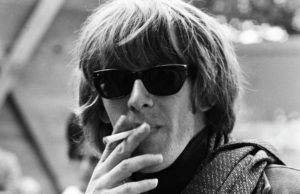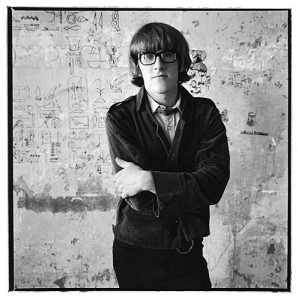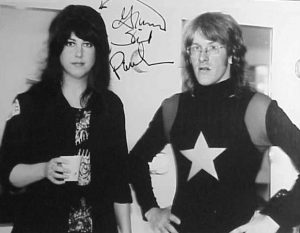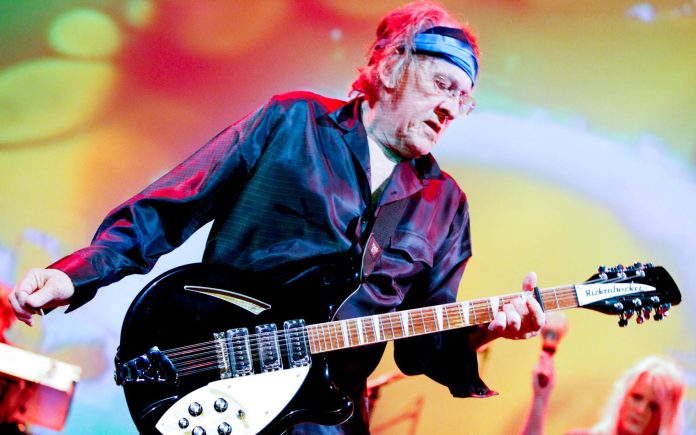HIT CHANNEL EXCLUSIVE INTERVIEW: April 2014. We had the tremendous honour to talk with a legendary musician: Paul Kantner. Paul is the co-founder of Jefferson Airplane and the leader of Jefferson Starship. With Jefferson Airplane performed at the three most famous American rock festivals of the ‘60s –Monterey (1967), Woodstock (1969) and Altamont (1969). Jefferson Starship released “Tales from The Mothership”, a live 4-CD set in 2012. Their latest studio release is “Jefferson’s Tree of Liberty” (2008). Read below the very interesting things he told us:
 In 2012 you released “Tales from The Mothership”, a live 4-CD set, recorded in Roswell, New Mexico in 2009. Why did you choose Roswell and what is special about this show?
In 2012 you released “Tales from The Mothership”, a live 4-CD set, recorded in Roswell, New Mexico in 2009. Why did you choose Roswell and what is special about this show?
Roswell is famous in this country to the fans of the space exploration and the Unknown, if you know what I mean. It has to do with science fiction. Actually, I love science fiction and I am writing stories about science fiction over the years –then and now- called “Tales from The Mothership”. Our manager took it and used it on the record.
Are you satisfied with the feedback you got from fans and press for Jefferson Starship’s “Jefferson’s Tree of Liberty” (2008) album?
Yes, we’ve got good response for that album and I enjoyed it. It took us back to a time when the music we played was written and performed as a way of expression. So, we had to revive a bit of that era and it was quite thrilling, enjoyable and adventurous from my point of you. And it worked out very well that. It also introduced the singer who sings with us six years now, Cathy Richardson. It has been fabulous to be with our band during the last six years.
Were you disappointed by the fact that you didn’t record “Jefferson’s Tree of Liberty” in Cuba?
Yeah. We had been working on going down and doing that and then the bullshit Administration and politicians got involved in and made it extremely difficult to go down and they are persecuting people who are doing business (ed: because of the United States embargo against Cuba). So, we were precluded from going there because of the politicians.
Are there plans for a new Jefferson Starship studio album?
Yes, I’m writing stuff right now. One of my favourite songs that I’m writing is the story about Mary Magdalene. So, I am writing a song about Mary Magdalene and her adventures and what she did and what she didn’t and various stories around her.
 Do you believe that concerts are more important than studio albums?
Do you believe that concerts are more important than studio albums?
No, they are two completely different worlds. You can’t do what you are doing on a live stage while in the studio. And you can’t accomplish in the studio what you do on a live stage where you just kiss ass. The architecture of the music is different. The music is different. You play differently, you respond differently. You respond with the fans in each concert and energy is going back and forth. But usually it’s not there in the studio. The two things are, not totally, but quite different and you have to learn to absorb them properly.
Did you expect the huge success of Jefferson Starship’s “Red Octopus” album (1975)? It reached #1 on the Billboard 200!!
You know, I have never expected the amount of success that we had. We just enter the studio making what we are doing at the time and we put it out. We put it out and it has many reactions and different degrees of success. But they are all for me an adventure within the architecture of music. There is an intellectual and emotional content there, in both of them. There are different ways both in live recording and studio recording.
What exactly was the role of Jerry Garcia (Grateful Dead) on “Surrealistic Pillow”?
Jerry just came down and we all respected him as a musician. We asked him to come down and help us learn the techniques of the studio. And we learned them together in a certain sort of way and experimented in them. Jerry was one of the elements of that experimentation and I thought it worked out really perfectly.
What do you remember the most of Woodstock?
Woodstock… Singing in the mud (laughs). It was raining and with all that, it was quite an exhilarating time for me. I enjoyed the flood, I enjoyed the rainstorm, I enjoyed the sun, I enjoyed the early morning when we played. I just had a good time all the way around.
Were you shocked by what happened at the 1969 Altamont Free Concert (during the performance by the Rolling Stones, Meredith Hunter, an 18-year-old African-American, was stabbed to death by a Hells Angels member)?
Yes, that was rather shocking. The incident nailed the end of the ‘60s in a way. It just gets out of your hands in places you play. Simply put, it just got out of our hand.
 You are one of the first persons in rock ’n’ roll who had an interest about science fiction with “Wooden Ships” and “Have You Seen the Saucers?” songs and “Blows Against the Empire” (1970) album. How did this interest begin?
You are one of the first persons in rock ’n’ roll who had an interest about science fiction with “Wooden Ships” and “Have You Seen the Saucers?” songs and “Blows Against the Empire” (1970) album. How did this interest begin?
It began for me in the second grade. My mother died and they put me in a military boarding school with nuns and that was a pretty bleak kind of atmosphere. I got left alone in the library one day and down the bottom shelf was a science fiction novel by C.S Lewis, I believe. The name of the novel was “Out of the Silent Planet” and for some reason I picked it up and started reading and I haven’t look back since. Science fiction has always provided me a place for imagination to flourish. It encourages me about a lot of things and there is a beauty to the adventure of all that is going through. A celebration, a passion, a joy, an ecstasy for exploring. Do you know what white water rafting is? For me our music is -particularly on stage- like white water rafting. We are going on a river, we are on a raft and we don’t know what is going to happen on the next turn, what kind of rocks we are going to fly over, how exciting is gonna get, how peaceful in certain places is gonna get. It’s a constant adventure on that kind of concept. We are just exploring ideas and passions and getting as much out of them as we can. It has to do with breaking the rules as well.
How important was Human Be-In event (January 14, 1967) for the San Francisco sound?
I don’t know what the San Francisco sound you talk about is. Originally, we thought that we would just go out and take our truck and set up our amps and just play out in the park which is my favourite place to play, Speedway Meadow. And that is what we did that day. But all of a sudden, instead of 1.000 people that was something that we normally saw, there were 20.000 people! All dressed crazy and we all had an extraordinarily good time. It was an extraordinary celebration of what was going on in San Francisco at that time.
You got to know Timothy Leary. Did you agree with his “turn on, tune in, drop out” philosophy and his concepts involving space migration, intelligence increase and life extension (SMI²LE)?
Yes, I agreed with all these opportunities about science fiction he talked about. I was in full agreement with him and we pursued a lot of that together. He lived in San Francisco nearby for a while, so I got to know him pretty well. He expressed a lot of things that were full of emotions. Good boy.
 A famous Greek composer, Manos Hadjidakis, stayed for some time at your house at 2400 Fulton Street. Do you remember him?
A famous Greek composer, Manos Hadjidakis, stayed for some time at your house at 2400 Fulton Street. Do you remember him?
No, sorry. I don’t. So many people came to that house in those days. It was like a transit station (laughs). It was a very busy place. A lot of people visited it.
Famous rock critic, Robert Christgau when he did the review for Deep Purple’s “Machine Head” album in 1972, wrote: “Personal to Paul Kantner: Check out Space Truckin’”. What did he mean?
I don’t know. No, really.
Do you think the 1989 Jefferson Airplane reunion was a right decision?
It was a good decision for the time, yes. I hoped they would go out a little longer than what we did. But we were all in different camps eventually after the summer was over and we never did get back together. It is always in my mind to find some perfect time to get together again somehow. And you can never plan these things. They just occur whether you have the choice to hold on or not.
Did you get on well with Bill Graham (legendary concert promoter and Jefferson Airplane manager)?
Yes, I was very proud of Bill Graham. I thought he was a dynamic manager and I was ashamed when we parted with each other. I thought of him as a very dynamic person who was different than the other people around. He managed to contribute hugely to what was going on in San Francisco in those days in his own right.
Did you enjoy the 1968 European tour with The Doors?
Oh, yeah! We had a lot of commons with The Doors. We both came up at the same time. We both had problems in our own way. We had a good time together and I enjoyed touring with them and even after Morrison died. We toured with Ray Manzarek and others from the band in various formations. I enjoyed that tour a lot.
 Are you still an anarchist?
Are you still an anarchist?
I never was what you call an “anarchist”. That is some politically-based kind of concept. I consider myself a San Franciscan. That has nothing to do with anarchy. It has to do with breaking the rules that need to be broken, finding things of beauty on the Earth and maybe exposing them to people. I think that is what we in San Francisco did better than anybody else. It’s about places and things and people’s duty and showing them to other people. I think passing things to other people was one of the strongest things that San Francisco people did in those days. And for what happens today even.
Was your 1968 rooftop performance in New York copied by the Beatles for “Let It Be” in 1969?
Yes, we were the first. We didn’t even get a promo. We just started playing in noon time and people in the streets all turned their head up. Turned their head up to the rooftop. It was a great afternoon from my point of view.
Do you miss old friends like Jerry Garcia and Spencer Dryden (Jefferson Airplane drummer, died in 2005)?
Of course. I am really not interested in sitting and crying. When people die I like to make a celebration of their life, rather than moaning and moaning. I am not going to funerals. I like to celebrate life.
What kind of music are you listening to at the moment?
You know, I am going back to my original mentor who was Pete Seeger and more particularly a band called The Weavers. Do you know my theory about The Weavers? That was what originally stimulated me to have three-part singing in a band, to have the kind of singing they had. That particularly singing with the woman in the band. It’s critical to me and I am still fond of that whole bunch.
You knew everyone. Who is the most talented musician you have ever seen?
Oh, there were so many of them around here. I can hardly focus on one. Jerry Garcia is up there on the top of the list along with Pete Seeger and The Weavers. Fred Neil is another extraordinary musician from way back then in the folk era. And then there was a whole proliferation of great guitar player from Mike Bloomfield (Bob Dylan, The Electric Flag) to Eric Clapton in his early days, Cream. Jorma (ed: Kaukonen –Jefferson Airplane guitarist) in our band was an extraordinary guitar player and Jack Casady (ed: Jefferson Airplane bassist) as well. And we had the great luxury of having really great players in our band.
 Did you like John Cipollina (Quicksilver Messenger Service) as a guitarist?
Did you like John Cipollina (Quicksilver Messenger Service) as a guitarist?
Oh, yes. John was very good. The bass player in his band, David Freiberg, is singing with Jefferson Starship today. But Cipollina was unique, he was himself and that’s what still amazes people with those days: the uniqueness.
What made you to write the song “Diana” on “Sunfighter” (Paul Kantner/Grace Slick album- 1971) about Diana Oughton, member of the Weather Underground?
Yes, the Weather Underground were some of those people involved in breaking rules in these days and trying to put it in a responsible way. So, I wrote that song to celebrate that particular fact: that people trying to do good things by breaking the rules at the same time and do what they suppose to do. And hopefully getting away with it. It was celebratory in that particular fashion.
A huge “THANK YOU” to Paul Kantner for his time and to Rick McNamara for his valuable help.
Official Jefferson Starship website: http://www.jeffersonstarshipsf.com
Official Jefferson Starship Facebook page: https://www.facebook.com/officialjeffersonstarship
Planet Earth Rock ‘n’ Roll Orchestra (PERRO) website: http://www.planetearthrocknroll.com


